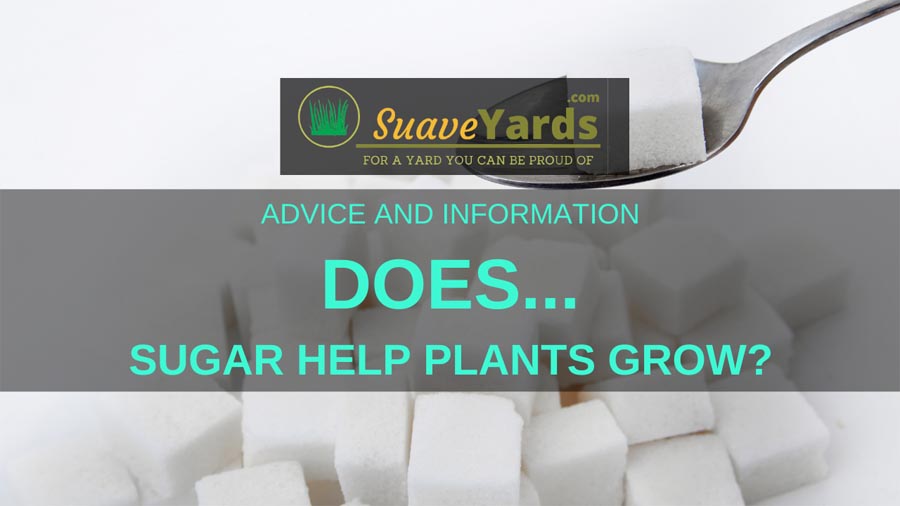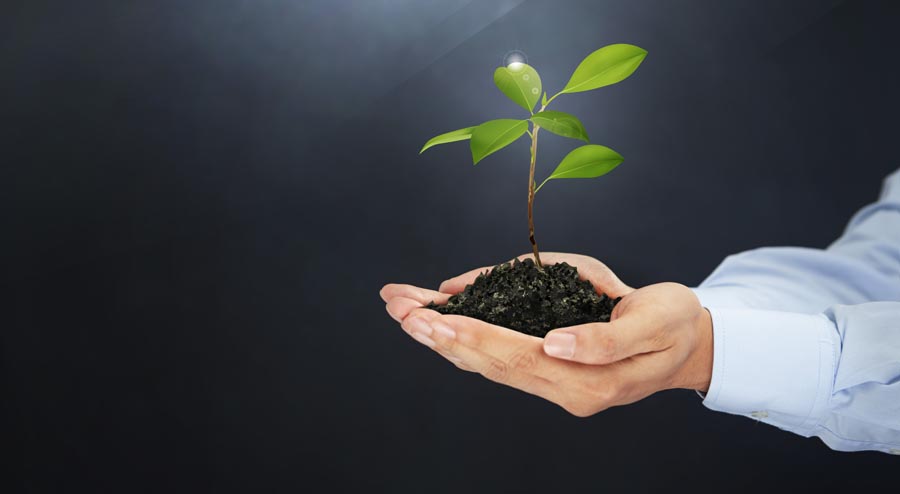
Does sugar help plants grow? Technically, yes! But it’s now what you think. It’s not about putting table sugar on your plants.
Read on to find out more about the effect of sugar on plants.
Does Sugar Help Plants Grow?
Yes. The sugar a plant produces itself through photosynthesis by trapping energy from the sun, helps it grow. Standard table sugar won’t help your plants grow.
Plants Produce Sugar
All green plants produce sugar, mostly glucose, through the process called photosynthesis. This natural process optimizes sunlight into energy.
Glucose, fructose, and sucrose are all sugars naturally found in plants. All food energy is based on these said sugars.
Moreover
These sugars are stored in the different parts of the plants: roots, leaves, seeds, or fruits.
Table sugar is made from sucrose, which is a type of sugar known as disaccharide. This means that it is a combination of two monosaccharides. The monosaccharides are glucose and fructose.
Check this out:
Sugar is important in plants because it is the energy source that allows plants to function.
For example, plants need to photosynthesize because this is also the process by which they produce oxygen. Sugar plays an important role in this process.
Then there’s the growth process
Sugar, the one that is naturally made in plants, is responsible for plant growth. The sugar found in leaves will prompt the transition from the infant stage to the adult stage.
In all phases of plant growth, sugar is necessary: from seed growth to leaf development, from stem surge to fruit growth, and so on and so forth.
It also has a hand in the ratio of the growth of the plant above the ground and below.

There’s more!
Sugar is also largely responsible for the plant’s structure.
The point is, sugar is important to plants. Sugar is also naturally made within the plant process or growth.
During photosynthesis, plants transform water and carbon dioxide to glucose using the energy from the sun.
The question is:
Should you add table sugar to plants in order to hasten the growth process?
Does Sugar Help Plants Grow?
Technically, yes! But, this would pertain to the sugar that the plants naturally produce.
You shouldn’t actually use table sugar for plants.
Here’s the thing:
Some gardeners have this growth hack for plants, particularly flowering plants, that use table sugar.
What they do is dissolve one-fourth cup of sugar to four cups of boiling water. Then, use this to water the plants.
The plants will be watered with the solution every three days while regular water will be used on the plants in between.
No, no, no!
You absolutely cannot practice such a thing.
Plants produce sugar naturally. They don’t actually need table sugar to grow and develop better.
You know what?
Adding table sugar could potentially harm the plants. In fact, table sugar can actually be used as a weed killer.
You have to remember, weeds are actually just plants–unwanted plants.
Back to table sugar
There are actually some cases where plants don’t have enough sugar for proper development. If this is the case, you actually need to address the issue of photosynthesis rather than adding sugar to the plants.
As earlier explained, photosynthesis is the process by which plants make their own food.
You need to look at the most important components for photosynthesis: sunlight, water, carbon dioxide, and air.
Really
There is no scientific evidence that table sugar will improve the growth of plants.
In fact, if you look at the science, you should know that this wouldn’t work. Plants usually produce glucose from photosynthesis.
Meanwhile
Table sugar is sucrose that has been refined. It is also a polysaccharide, which makes it harder for the plant to break down.
Glucose, as we mentioned earlier, is a monosaccharide.
Further
The roots will never absorb the table sugar solution.
Does that mean there’s no harm done? Wrong!
Although
There’s another reason why people would mistake sugar’s effect on plants.
Table sugar actually works wonders on cut flowers.

Look
If you want to make your flowers last longer when placed in a vase, use the sugar solution. The cut roots or stem will absorb the sugar and allow the flowers to last longer.
They may even look better and healthier.
As for the ratio, it depends on what type of flower you are using it on. A common rule of thumb is a teaspoon of sugar for every four cups of water.
Moving on
We mentioned that table sugar may actually pose more danger to the plant than provide benefit. We’ll tackle that next.
What Sugar Can Do to Plants
Table sugar could impede the ability of the plant to absorb water. As you well know, water is very important in the survival of plants.
The table sugar solution could certainly damage the plants.
Another thing
The sugar solution may attract microorganisms that may not be good for the plants.
There is also a possibility that too much sugar could lead to reverse osmosis. This would lead to the plants losing water and eventually wilting.
Then there’s this:
Sugar could also kill plants that don’t do well in environments that are low in nitrogen.
Nitrogen is an important nutrient in plants. Sugar is a carbon nutrient but doesn’t contain any nitrogen.
So, since sugar would limit the growth in plants, those who need nitrogen to thrive will surely not survive.
In fact
You can actually use sugar to kill weeds.
This is actually a good way to limit the use of herbicide, which is not exactly good for the environment.
Basically
You just need to sprinkle sugar all over the base of the weeds. You can use either granulated or powdered sugar.
Then water over it. You don’t want to attract ants and other insects or animals who love sweet stuff.
Or you could make the sugar solution and water the weeds with it.
However
This would take time. You have to be patient. You may also need to pour sugar again if the weeds are not reacting to it.
The sugar over the weeds will allow them to seek nitrogen from the soil. With competition, the weeds will eventually deplete all nitrogen present in the soil.
Without nitrogen, the weeds will die.
In relation to that:
This is precisely the reason why you should not use sugar on your plants.

Sugar works best against broadleaf and annual weeds.
What Helps Plants Grow?
Instead of using sugar, just try to nurture plants the regular way.
Plant food
Instead of feeding plants sugar, use plant food instead.
No, this is not the same as fertilizer. You see, fertilizer is something you put in the soil in order to keep plants healthy.
Plant food occurs naturally to plants, but only if the environment is right.
What makes it right?
For one, the soil should have proper nutrition. The plants should also have access to sunlight and water.
Through that, they make their own food through the process of photosynthesis, which we have covered more than a couple of times in this article.
Still
There is plant food you can actually buy in stores. Or you can make your own organic plant food.
Club soda
This is basically mineral water with carbon dioxide bubbles. It could really help with growth for seedlings.
You see, seedlings don’t have enough leaves yet for photosynthesis. With club soda, the seedlings will be able to absorb gas quickly and help with photosynthesis.
Of course
There are also the basics:
Appropriate amount of water
It’s a given that plants need water–but how much water?
This is why it’s really advisable that people research about the specific plants they are growing before actually growing them.
Every plant has different needs. It follows that every plant needs a different amount of water.
Check this out:
Overwatering and underwatering could actually lead to plant malnutrition, or worse, death.
Too much water could drown them and too little could dehydrate them.
Nutrients
There are actually 17 elements that plants need to grow healthy.
There are those that plants get naturally:
- Oxygen
- Carbon
- Hydrogen
Then there are those that they get from the soil:
- Nitrogen
- Phosphorus
- Potassium
- Sulfur
- Calcium
- Magnesium
Plus, micronutrients:
- Boron
- Chlorine
- Copper
- Iron
- Manganese
- Molybdenum
- Nickel
- Zinc

Summary
Does sugar help plants grow? Yes! But this refers to the sugar that the plant itself produces through photosynthesis.
You see, during the process of photosynthesis, the plant will trap the energy from sunlight with its leaves. That energy will then be used to transform water and carbon dioxide into sugar known as glucose.
However, table sugar or sugar solution (sugar dissolved in water) does not aid in the growth of plants. In fact, it may actually cause the death of plants. Sugar is actually an organic weed killer.
Useful Resources
- Experimenting with Water Sugar in Plants – ABC 11
- Sugar on Weeds: Using Sugar to Kill Weeds in Lawn and Gardens – Gardening Know How
- The Effects of Sugar and Salt Water on Plants – Healthfully

